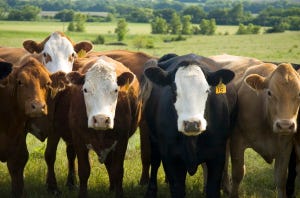Agriculture truly feeds the U.S. economy
U.S. agriculture accounts for 30% of U.S. jobs and $7.43 trillion in economic impact.

Nearly 18% of the nation’s economy and 30% of American jobs are either directly or indirectly linked to the food and agriculture sectors, according to a new report, Feeding the Economy, released by 30 agricultural groups in conjunction with National Ag Day on March 22, 2022.
The report finds that a total of 43 million jobs, including 21 million direct jobs, are related to the ag sector with $2.3 trillion in total wages and $7.43 trillion in total food and industry economic impact. Exports also account for nearly $183 billion.
California, Texas, Florida and New York in that order top the nation in both direct jobs and federal taxes. Louisiana is the top export state, followed by California, Washington, Texas and Illinois.
To measure the total economic impact of the sectors, the analysis also includes the direct and indirect economic activity surrounding these industries, capturing both upstream and downstream activity. For example, when a farm equipment retailer hires new employees because farmers are buying more tractors, experts consider the new salaries an indirect impact. Similarly, when a retail associate spends her paycheck, an induced economic impact occurs. Together, these have a multiplier effect on the already formidable direct impact of food and agriculture.
“The 2022 Feeding the Economy findings reinforce that America’s food and agriculture industries are fundamental to a healthy U.S. economy,” says John Bode, president and CEO of the Corn Refiners Association. “The data also reveals that these industries, aside from the restaurant sector, have largely recovered from the effects of the pandemic.”
Bode, who leads CRA which is the lead organizer of the report, adds international markets are a key component of the ag and food sectors’ financial success. However, in the last decade the U.S. has fallen behind global competitors in trade, risking diminished American economic competitiveness and investment opportunities.
“While the data showcases these industries’ broad influence at home, it also underscores the importance of access to international markets,” Bode says. “International trade is critical for the success of agriculture related industries – 95% of the world’s consumers are located overseas and exports account for more than 20% of U.S. agriculture production volume. But the pandemic disrupted global supply chains and seriously impacted our ability to export internationally.”
Bode says the agriculture and food industries are working to address those gaps and rebuild a more resilient supply chain but are doing so without a strong U.S. leadership position on trade.
“Just as supply chain disruptions are fueling food price inflation, the need to build more resilient supply chains calls for a pivot in U.S. policy. The U.S. should prioritize new tariff reducing trade agreements that will benefit consumers and U.S. job opportunities by the U.S. resuming its lead in defining the terms of international trade,” Bode says.
"Food security is national security," adds Rep. Dusty Johnson, R-S.D., who plans to speak on a panel Wednesday highlighting the report. "A strong ag economy is vital to American competitiveness – that’s why I’ve been on leader on the Ocean Shipping Reform Act to secure American exports and reinforce rules of the road for foreign ocean shippers. COVID-19 exposed the weaknesses in our economy, and Congress should do all it can to maintain global competitiveness for our producers."
“From a researcher on campuses, to a geospatial engineer, to the grocery delivery driver--food and agriculture jobs are all around us," adds CropLife America. "The innovation needed to continue to grow food, sustainably, for everyone, will spur economic growth in agriculture for the next decade. CropLife America is proud to be Feeding the Economy through investments in new products that help farmers manage the pests that threaten the health and safety of our food crops.”
The National Pork Producers Council says the U.S. agriculture sector, including the pork industry, is an economic powerhouse, key to the prosperity of rural America. "The U.S. pork industry employs more than 550,000 Americans and generates nearly $24 billion in personal income to keep kitchens stocked with a quality, nutritious and affordable source of protein,” NPPC says.
Matt Ott, president and CEO of the Global Cold Chain Alliance, says 2022 brings new challenges, but also new opportunities for American food and agriculture. "GCCA members have worked tirelessly to ensure the supply chain keeps moving and the world’s food supply is secure through uncertain times. The cold chain serves as a crucial link in the supply chain, moving over 213 billion pounds of perishable food annually. We are proud to support this year’s Feeding the Economy study as it continues to highlight the economic importance of food and agriculture,” Ott says.
Constance Cullman, president and CEO of the American Feed Industry Association, shares over 9.8 billion farm animals and 135 million pets rely on our nearly 1 million essential workers to provide safe animal food to foster healthy growth and development. "While feeding America’s livestock and pets, we also help keep our food supply stocked with affordable and nutritious protein and dairy foods and promote the vitality of our rural communities. With nearly $300 billion in sales and a resulting $22.5 billion to local, state and national governments, we are interwoven into the fabric of America’s heartland," explains Cullman.
Ag day proclamation
In a proclamation on National Agriculture Day, President Joe Biden recognizes the “the invaluable contributions of American farmers, farmworkers, ranchers, fishers, foresters, and other agricultural workers, who have practiced their craft for generations and touch the lives of Americans every day. Their tireless efforts growing crops, raising livestock, and distributing food, fuel, and fiber sustain America and the entire world. They put meals on our plates, clothes on our backs, and roofs over our heads. Along the way, America's agricultural workers serve as stewards of the land; ensure the safety and health of animals, plants and people; and strengthen our rural communities with economic opportunities.”
Biden adds his administration is “committed to helping the agriculture sector enhance its resiliency and sustainability while increasing its productivity and profitability. By working together, we can ensure that American agriculture continues to lead the world in production, that our food supply is secure, and that our economy remains strong.”
Many involved in agriculture joined together for the inaugural Celebration of Modern Agriculture on the National Mall near the USDA headquarters on Monday, March 21 and Tuesday, March 22. The event will showcase America's equipment manufacturers, farmers, ranchers and agriculture innovators on the cutting-edge of science and technology.
About the Author(s)
You May Also Like


.png?width=300&auto=webp&quality=80&disable=upscale)


